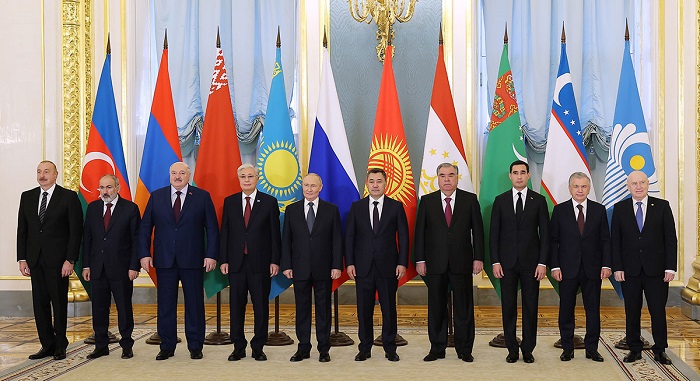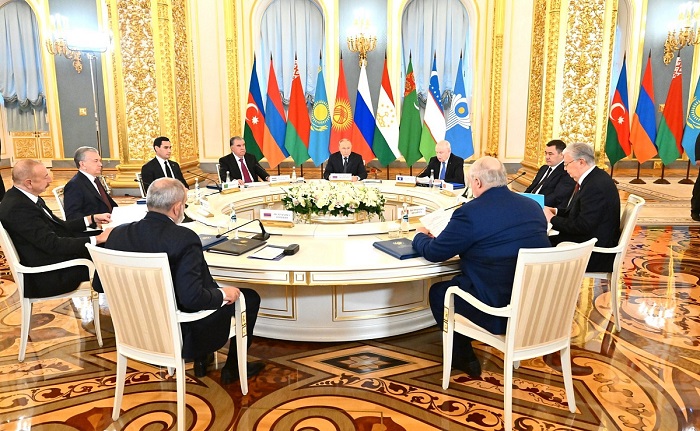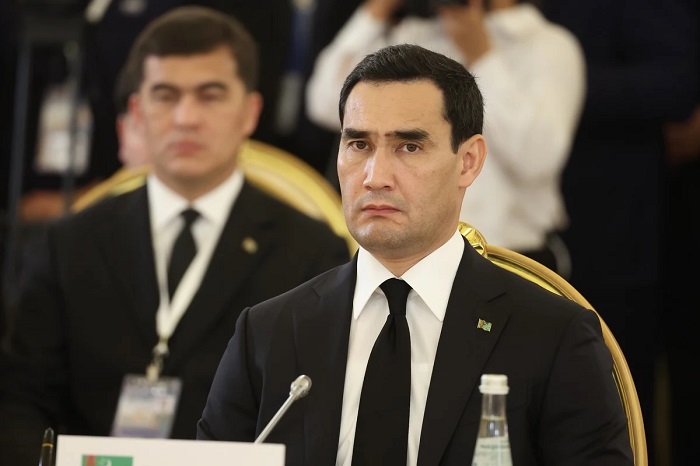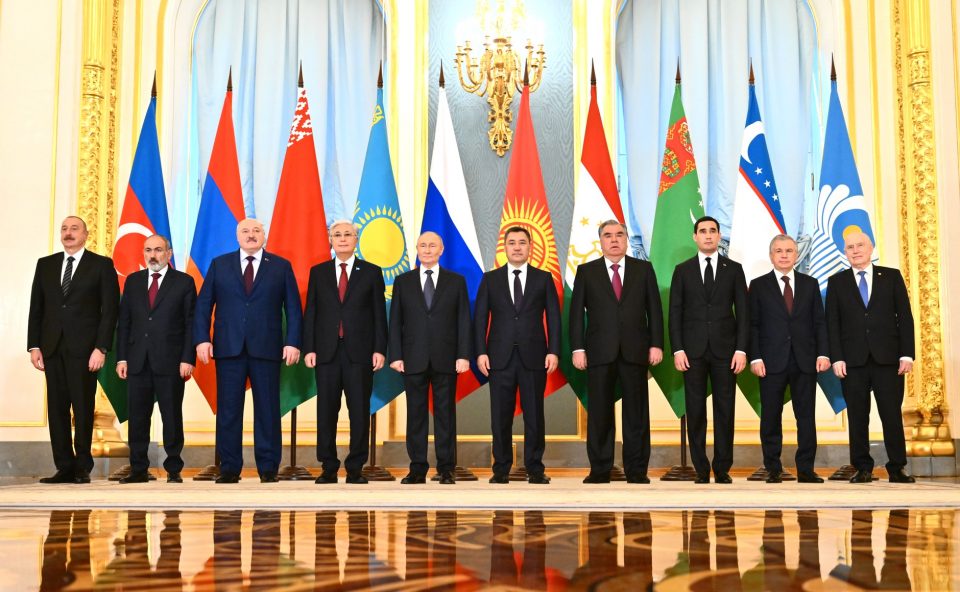On 8 October 2024, a regular meeting of the Council of CIS Heads of State was held in Moscow under the chairmanship of President Vladimir Putin of Russia.
 The meeting was attended by President of Azerbaijan Ilham Aliyev, Prime Minister of Armenia Nikol Pashinyan, President of Belarus Alexander Lukashenko, President of Kazakhstan Kassym-Jomart Tokayev, President of the Kyrgyz Republic Sadyr Japarov, President of Tajikistan Emomali Rahmon, President of Turkmenistan Serdar Berdimuhamedov, President of Uzbekistan Shavkat Mirziyoyev, as well as CIS Secretary General Sergey Lebedev.
The meeting was attended by President of Azerbaijan Ilham Aliyev, Prime Minister of Armenia Nikol Pashinyan, President of Belarus Alexander Lukashenko, President of Kazakhstan Kassym-Jomart Tokayev, President of the Kyrgyz Republic Sadyr Japarov, President of Tajikistan Emomali Rahmon, President of Turkmenistan Serdar Berdimuhamedov, President of Uzbekistan Shavkat Mirziyoyev, as well as CIS Secretary General Sergey Lebedev.
The following documents were adopted during the summit:
• An Address to the peoples of the CIS countries and the world community in connection with the 80th anniversary of the Victory of the Soviet people in the Great Patriotic War of 1941-1945.
• The decision to declare the city of Lachin (Azerbaijan) as the Cultural Capital of the Commonwealth in 2025, the city of Meghri (Armenia) in 2026, and the city of Molodechno (Belarus) in 2027.
• Convention on the Legal Status of Delegations Sent to the CIS Countries.
• Amendments to the Treaty on the Interstate Search for Persons dated 10 December 2010.
• The program of cooperation in the field of deradicalization for 2025-2027. The document was developed by Uzbekistan, the basic organization for the study of problems of countering terrorism and other manifestations of extremism and the Anti–Terrorist Center of the CIS member states.
• By the decision of the Council of Heads of State of the CIS, 2027 was declared the Year of Legal Education in the Commonwealth of Independent States.
• Statement on the development of cooperation in the field of artificial intelligence for civil purposes. The Statement advocate the formation of an international system for regulating artificial intelligence with the central coordinating role of the United Nations on the basis of the exclusive right of states to make decisions within the framework of an equal and mutually respectful dialogue in accordance with international law.
• The decision to establish the honorary title “City of Labor Glory. 1941-1945”
• Tajikistan will chair the CIS in 2025. Russia, as the former chairman, and Turkmenistan, as the future chairman of the CIS, will act as co-chairs.
Next year, the CIS summit will be held on 10 October 2025 in Dushanbe.
 Speech by President of Turkmenistan Serdar Berdimuhamedov at a meeting of the Council of Heads of State of the Commonwealth of Independent States
Speech by President of Turkmenistan Serdar Berdimuhamedov at a meeting of the Council of Heads of State of the Commonwealth of Independent States
Dear Vladimir Vladimirovich, Dear Heads of State!
First of all, I would like to express my gratitude to the President of the Russian Federation for his hospitality, warm welcome and excellent working conditions.
And before turning to the topic of our meeting, let me once again congratulate dear Vladimir Vladimirovich on his birthday, wish him good health and new successes in his service to the Russian people and the state!
Vladimir Vladimirovich enjoys great respect and authority in Turkmenistan, is one of the architects of friendship, good-neighborliness and cooperation between our countries.
Dear participants!
The current year for the Commonwealth of Independent States is marked by the implementation of the main priorities and tasks. These include strengthening security and stability; deepening economic partnership; and expanding humanitarian ties.
 I believe that in the coming period, the Commonwealth faces the goals of maximizing our potential to fulfill the agreements reached and new goals dictated by current changes and trends in global political and economic life.
I believe that in the coming period, the Commonwealth faces the goals of maximizing our potential to fulfill the agreements reached and new goals dictated by current changes and trends in global political and economic life.
I am convinced that our main task as responsible states is to continue working together to ensure lasting peace and stability in the Commonwealth. This can be achieved by pursuing a coordinated line to further strengthen the mechanisms of political and diplomatic cooperation within the CIS, defending positions in favor of peace and security in the global arena and in international organizations.
The issue of countering new challenges and threats is particularly acute today. I am referring primarily to such serious risks as biological hazards, cybercrime, and the illegal use of information platforms. I believe that our countries need more active, coordinated and structured approaches to these phenomena, develop mechanisms to protect against attempts of destructive influence on state institutions and public life, purposefully stop attempts to infiltrate elements of radicalism, spread hostility and intolerance.
We need to use the political, diplomatic, organizational, scientific, technical and other resources at our disposal. Peace, stability, and security within the Commonwealth must be inviolable and reliably guaranteed.
On the outer contour, we face no less significant tasks. The session of the UN General Assembly that has begun has shown the existence of considerable and largely conceptual differences in approaches to solving a number of acute problems of modern geopolitics. Nevertheless, despite all their seriousness, Turkmenistan proceeds from the fact that stabilization of the situation in the world is possible, and it lies in the political, diplomatic, and negotiating plane. The most important factor in this context is the use of the UN as the only organization with universal legitimacy in maintaining global security and stability.
Next year will mark the 80th anniversary of the founding of the United Nations. This is a major milestone.
It is obvious that the CIS, as a partner of the UN, needs to do a lot of work aimed at strengthening the world organization, supporting and uniting member states around the UN Charter, countering attempts to discredit and dilute its functions.
Turkmenistan considers holding events within the framework of the International Year of Peace and Trust next year to be an important part of our joint activities in this regard, in accordance with the resolution of the General Assembly adopted on the initiative of our country. Of course, as the author of this proposal, Turkmenistan will play a proactive role in the upcoming work, and we would like to involve our CIS partners in these activities as much as possible. I am convinced that, given the current challenges, solid, weighty work within the framework of the Year of Peace and Trust can become a significant constructive contribution to improving the situation in the world, giving political and moral impulses to all healthy forces advocating normalization, de-escalation, transition to a respectful, predictable dialogue and communication. The Commonwealth of Independent States must play a significant role in this.
Dear participants!
At the meeting of the Council of Heads of Government of the CIS held in Ashgabat in May this year, agreements were reached and specific tasks were set to further deepen economic partnership. The priorities include transport, energy, industrial cooperation, and a number of other areas. Turkmenistan fully supports this approach. Advocating the full implementation of the provisions of the CIS Economic Cooperation Strategy until 2030, we proceed from the need for a phased and consistent implementation of the document, adhering to the schedules of agreements.
In general, we are convinced that the CIS, in its economic activities, should focus on major, defining trends in global geo-economics in order to ensure its strategic involvement. The essence of these trends today is the shift of economic development to the south and southeast. The CIS is a natural space in this irreversible movement.
One of the effective ways is the participation of the CIS in international and regional projects in the south and south-east directions from the borders of the Commonwealth. Moreover, the opportunities for this are opening up. More recently, in mid-September, Turkmenistan began the practical implementation of a new stage of construction of large infrastructure facilities. The construction of the Afghanistan part of the Turkmenistan–Afghanistan–Pakistan–India gas pipeline has started. The Afghan section of the Turkmenistan–Afghanistan–Pakistan power transmission line has been launched. The construction of the Turkmenistan–Afghanistan railway line through the territory of the neighboring state has begun.
The participation of the Commonwealth countries in these and other similar projects is a reliable way to reach a strategic perspective, and we must fully utilize our combined resources and potential.
This fully applies to the issue of transport connectivity, primarily in the context of the implementation of the Action Plan for Infrastructure Optimization and the Development of International Corridors passing through the territories of the CIS member States for the period up to 2030.
Turkmenistan attaches particular importance to the cooperation of the CIS countries in the North–South transport corridor project along the eastern coast of the Caspian Sea with further access to Iran and further to the seaports of the Indian Ocean. In this regard, we propose to start a substantive discussion and agreement on common tariff, customs, visa and other preferences for the participating countries of the project.
We believe that similar work should be carried out in the context of plans to create transport corridors through the territory of the countries of Central Asia and the Caspian region along the East–West line.
I propose to consider in concrete terms the modalities of this work – with an indication of deadlines, agenda, etc., and give instructions to the relevant departments of our countries.
In the energy sector, Turkmenistan advocates expanding the volume and geography of energy supplies across the CIS and beyond. We are talking about both raw materials and electricity.
It is very important area to create conditions in the CIS for the functioning of a “green” economy, the formation of economic and industrial clusters based on low-carbon energy. This is a promising task, but we need to approach its implementation now, using the serious scientific and technological potential that exists in our countries, creating conditions for joint research and practical cooperation.
Dear Heads of Delegations,
Against the background of the complex processes that are currently being observed in different parts of the globe, our task, responsibility and purpose is to preserve what is of particular importance to the peoples of the CIS – traditions of good neighborliness, mutual understanding, respect based on those historical ties and basic values that we share.
An effective way to preserve and develop them is broad and multifaceted cultural cooperation, the participation of the Commonwealth countries in holding major events that take place in our countries on significant occasions.
Turkmenistan highly appreciates the fact of the participation of high delegations of the Commonwealth countries in the upcoming International Forum dedicated to the 300th anniversary of the birth of Magtymguly Fragi in Ashgabat in just two days. We express our sincere gratitude for this.
Dear Heads of Delegations,
Turkmenistan reaffirms its firm commitment to the further development and strengthening of cooperation within the CIS, openness to discussing and implementing joint plans, solving urgent tasks on the principles of equality, mutual respect and consideration of interests, as is customary in our long-term joint work.
In conclusion, I would like to express my gratitude to the Russian Federation for its effective chairmanship of the Commonwealth.
I also express my gratitude to the Secretary General of the CIS, Sergey Nikolaevich Lebedev, for coordinating our cooperation and contributing to the preparation and successful holding of this meeting

